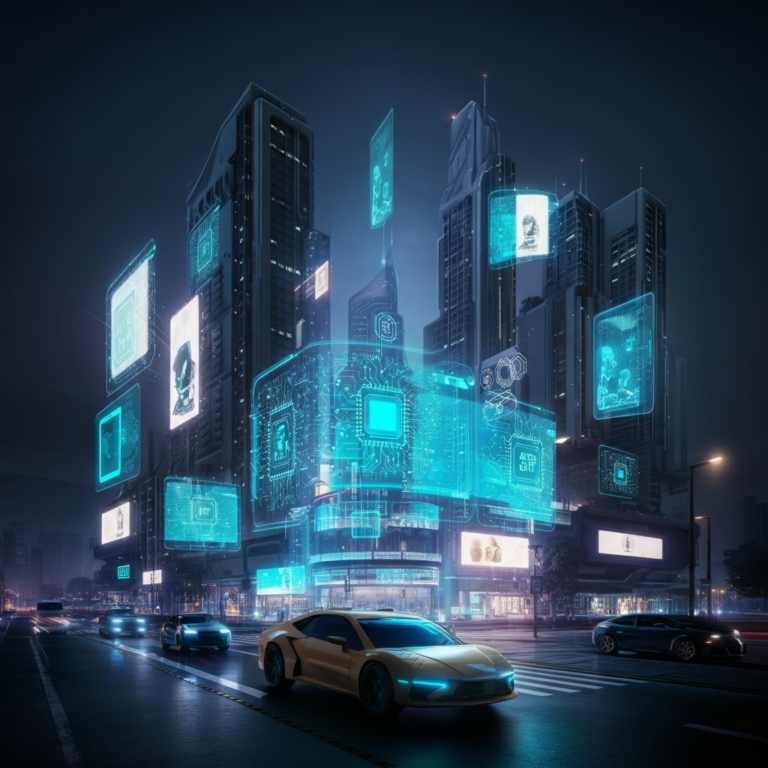Artificial Intelligence (AI) is no longer a futuristic concept confined to sci-fi novels or Hollywood blockbusters. It’s here, and it’s transforming the way we live, work, and interact. From virtual assistants like Siri and Alexa to predictive analytics that power business decisions, AI is becoming an integral part of our daily lives. But what does the future hold for this rapidly evolving technology? How will it shape industries, improve lives, and address some of the world’s biggest challenges?
This blog will explore the exciting future of AI, its current applications, and how it’s actively shaping critical sectors like healthcare, education, business, and even climate change mitigation. Whether you’re an entrepreneur, a professional, or simply curious about the power of AI, this guide will help you understand the potential of artificial intelligence in the years to come.
What is Artificial Intelligence?
Before we look ahead, it’s essential to define what AI actually is. At its core, AI refers to machines and systems designed to mimic human intelligence. This includes learning from data, solving problems, recognizing patterns, and even making decisions—often faster and more efficiently than humans. There are two main types of AI:
- Narrow AI – Focused on specific tasks like image recognition or recommendation algorithms (think Netflix or Spotify).
- General AI – An advanced concept where machines could perform any intellectual task a human can do. While still largely theoretical, it represents the ultimate goal of AI development.
Today, most AI applications fall under the “narrow AI” category, but advancements in machine learning (ML) and neural networks are rapidly pushing the boundaries.
Current Applications of AI Across Industries
AI is already making an impact across various domains. Here are some key examples of how it’s currently being used in the real world:
1. Healthcare
AI-powered tools are revolutionizing healthcare by enhancing diagnostics, personalizing treatment, and accelerating research. For instance:
- AI algorithms detect early symptoms of diseases like cancer with higher accuracy than traditional methods.
- Chatbots provide 24/7 support to patients, answering questions and scheduling doctor visits.
- Predictive models, like those from Google’s DeepMind, analyze patient data to predict potential health issues ahead of time.
2. Education
AI is reshaping how students learn and teachers teach. Adaptive learning platforms like Coursera or Khan Academy use AI to tailor content to individual learning styles and paces.
- Virtual tutors help students grasp difficult concepts outside of the classroom.
- AI also enables educators to efficiently grade assignments and identify students who need additional support.
3. Business and Automation
From customer service chatbots to data-driven decision-making, AI is indispensable for modern businesses:
- Chatbots handle customer inquiries more efficiently, reducing wait times.
- AI analyzes vast datasets to provide actionable insights, optimizing processes and boosting productivity.
- Tools like Jasper help create better-written marketing content or even complete technical writing tasks, empowering teams to focus on creative strategy rather than mundane tasks.
4. Climate Change
AI is playing a vital role in addressing climate issues:
- Predictive AI models are helping forecast weather patterns and natural disasters.
- It optimizes energy consumption in industries and buildings, aiding in sustainable practices.
- AI-powered solutions are mapping deforestation, protecting biodiversity, and monitoring climate data globally.
The Future of AI – What’s Next?
While AI is already ingrained in many facets of life, its future holds even more promise. Here’s what to expect in the coming years:
1. AI-Powered Healthcare Breakthroughs
AI is poised to revolutionize personalized medicine. Imagine tailored treatment plans based on your genetic data and lifestyle patterns, powered by AI. Predictive healthcare models will help doctors detect diseases long before symptoms appear. Robotic surgeries using advanced AI will become more precise, reducing recovery times and complications.
2. Seamless Human-AI Interaction
AI will become more capable of understanding human emotions and intent, enabling more natural interactions. This means smarter virtual assistants, better customer service bots, and even AI companions capable of engaging in meaningful conversations.
3. Smarter Cities
The future will see AI driving smart cities, enhancing urban living. AI will manage traffic flows to reduce congestion, optimize energy grids for efficiency, and even predict infrastructure maintenance needs before failures occur.
4. Ethical AI and Accessibility
As AI becomes more ubiquitous, the focus will shift toward ensuring ethical practices. Developers and policymakers will collaborate to eliminate biases, protect privacy, and ensure that AI is accessible to smaller businesses, non-profits, and underrepresented communities.
5. Advancements in Autonomous Systems
Self-driving cars and drones powered by AI will become standard. These advancements will not only improve transportation efficiency and safety but also reduce carbon footprints by optimizing fuel use and routes.
6. Hyper-Personalized Marketing
With AI continuing to evolve, businesses will have access to precision-level targeting. Imagine personalized online shopping experiences where AI curates products to fit your preferences and needs.
Challenges and Ethical Considerations
While the future of AI is undoubtedly exciting, it’s also fraught with challenges. Key concerns include:
- Bias in AI models – Algorithms can perpetuate existing societal biases if not carefully monitored.
- Privacy and Data Security – With AI relying heavily on data, protecting user information becomes paramount.
- Job Displacement – Automation may lead to job loss in some sectors, requiring reskilling and workforce transition programs.
Fortunately, transparency, ethical regulation, and human oversight can address these challenges effectively.
How You Can Prepare
Businesses and individuals alike can take proactive steps to harness the power of AI and stay ahead:
- Learn the Basics – Understand what AI is and how it applies to your industry. Platforms like Coursera and Udemy offer accessible courses to get started.
- Adopt AI Tools – Identify areas where AI can improve efficiency or productivity in your work or life.
- Stay Updated – Follow industry trends to remain informed about new AI developments.
Transform Your Workflow with AI
AI is shaping the future, and it’s doing so faster than we could imagine just a decade ago. Whether it’s in healthcare, education, business, or climate change, the technology stands to make our world smarter, more efficient, and perhaps even more equitable.
If you’re ready to see how AI can improve your efficiency and creativity, why not try a tool like Jasper? It’s designed to streamline workflows, optimize content creation, and help you become more productive than ever before.
The future of AI isn’t just about technology; it’s about creating a better tomorrow for everyone.





















0 Comments